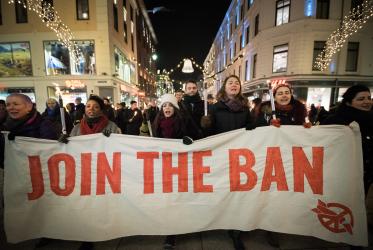We stand on the threshold of hope for elimination of nuclear weapons in the world, as 122 nations recently have signed the treaty on the prohibition of nuclear weapons. However making this hope a reality requires the strong engagement of the religious communities, says Rev. Dr Peniel Rajkumar, WCC programme executive for Interreligious Dialogue and Cooperation.
A new moral imagination, a compassionate conviction and a committed cooperation are the kinds of engagement needed from religious communities more than ever moving towards the elimination of nuclear weapons, said Rajkumar in his address at the 30th Anniversary of the Interreligious Prayer Meeting for World Peace. The meeting took place on 3-4 August on Mount Hiei near Kyoto, Japan, 72 years after the bombing of Hiroshima and Nagasaki.
“History has taught us that the case for promoting nuclear energy remains questionable on environmental, ethical and economic grounds”, said Rajkumar. “The nuclear disasters of Three Mile Island, Chernobyl and Fukushima confirm that not only nuclear weapons but also sources of civil nuclear energy have the capacity to trigger a nuclear disaster.”
Issues around nuclear energy and especially nuclear weapons tend to strike at the heart of the moral fabric of our common existence. The ethical loopholes around nuclear energy and the moral bankruptcy around nuclear weapons confirm what Martin Luther King, Jr. once noted: “when scientific power outruns spiritual power, we end up with guided missiles and misguided men.”
Over the past 72 years powerful nations have normalized nuclear weapons by ensuring a persistent presence for them in national security psychology, military budgets and force deployments, in nationalistic symbols and rhetoric. But the discernment must inform our common future.
“Military and civilian uses of nuclear technology both produce large quantities of poisonous materials that do not exist in nature and are among the world’s worst forms of environmental contamination,” WCC’s nuclear policies state.
“In order to provide cover for our political compulsions and economic ambitions, our arms industry has successfully marketed the lie that the only way to make the world safe is by increasing our nuclear arsenals”, said Rajkumar. “We have fostered a moral environment where one cannot imagine living without the possibility of killing and being killed.”
“Instead, we need to nurture a moral imagination which refuses putting greater trust in weapons than in our common humanity. With each nuclear weapon produced or tested we squander our capacity and responsibility to be human.”
Much of the procrastination around the total elimination of nuclear weapons emerges from an attitude which sees nuclear weapons as a futuristic threat. But the conviction to act can be expedited if we see nuclear weapons as threatening our very present. “For this we need hearts of compassion which see the exorbitant price that the most vulnerable among us pay for our morbid addiction to nuclear stockpiling”, said Rajkumar.
“We need to be convinced that a nuclear arms race in a world where hundreds die each minute due to preventable reasons is the worst form of blood sport – where the death and blood of the innocent merely serve to entertain. The moral horrors of contributing to mass deaths each minute should move our hearts, minds and wills to invest not in death but in life.“
On 7 July 2017, 122 nations signed the Treaty on the Prohibition of Nuclear Weapons, leading to their total elimination. But the treaty will enter into force when the states will have ratified it, globalizing the norm that nuclear weapons must be eliminated.
“That is the time for broad interfaith consensus around nuclear weapons to be translated into common action”, said Rajkumar. Religious communities need to work with policy makers, diplomats and civil society organizations, which requires a committed cooperation built around solidarity.
“We can no longer be silent. In a world where it often seems that there is enough religion to make us hate one another but not enough to make us love one another we need to walk together. We need to walk hand-in-hand, with hearts moved with compassion and heads gripped by a fresh imagination that will make a new world in which not some lives, but all life, matters.”





